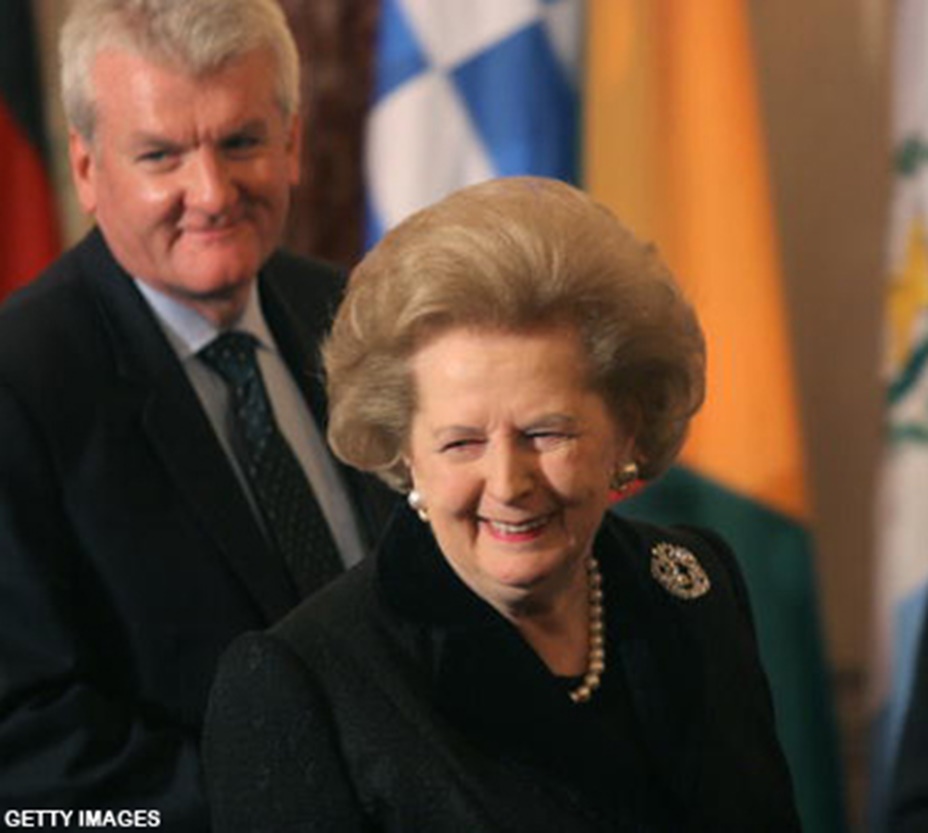There are no plans for next Wednesday’s Premier League matches to be postponed, even though "they may be vying for police support with Margaret Thatcher’s funeral," according to Sarah Ebner of the LONDON TIMES. The former Prime Minister’s funeral will be held next week at St. Paul’s Cathedral. It will be attended by the Queen, her husband Prince Philip and other heads of state and dignitaries from across the globe. Although the public "will not be able to attend the funeral service itself, thousands may line the route of the procession." Parliament is "expected to be suspended for the event," but "it is highly unlikely" that the Premier League matches between West Ham United against ManU and Fulham against Chelsea will be delayed. Manchester City is also playing Wigan Athletic. The Metropolitan Police said it was “too early” to make a call on postponing the games. However, football clubs "are used to working with their local police forces and there are regularly events which go on at the same time as sporting fixtures" (LONDON TIMES, 4/9). In London, Andy Hodgson reported the Premier League confirmed that clubs "will not be asked to hold a minute’s silence" for Thatcher. Football League chiefs "took the same line," but said that individual clubs "were free to organise their own tributes" for Thatcher (EVENING STANDARD, 4/9). Also in London, David Kent reported Wigan Chair Dave Whelan "has called for a one-minute silence" in honor of Thatcher. Whelan believes that football fans "should pay their respects to the deceased Prime Minister." Whelan: "We owe Mrs. Thatcher a minute's silence. We have to say thank you very much for the service she gave" (DAILY MAIL, 4/9). In London, Oliver Kay wrote football authorities "are determined to resist growing pressure" from inside and outside the sport, to hold a minute’s silence before this week’s fixtures.The FA, the Premier League and the Football League say that "it would be inappropriate" to call for such tributes. The England and Wales Cricket Board said it "has no plans for silent tributes" before Thursday’s first round of matches in the LV= County Championship season, but "has advised counties to fly flags at half-mast" for next Wednesday's funeral. Premier Rugby has said its 12 clubs "will be left to decide" if they will hold a moment of silence before this weekend's matches (LONDON TIMES, 4/10).
ROCKY RELATIONSHIP: EUROSPORT's Early Doors blog wrote, "As a nation absorbed Monday's monumental news ... football, unusually stayed mute." The national sport "is not always so reluctant to honour the dead." A minute of silence is "usually offered enthusiastically." Yet, the death of Thatcher "elicited nothing but stony silence." In an era when football "holds politicians in its thrall, providing the perfect ground on which to seamlessly identify with common folk, Thatcher and her colleagues seemed to hold the sport, and more specifically its supporters, in contempt" (EUROSPORT, 4/9). GOAL's Oliver Platt wrote that Thatcher "oversaw a period of enormous tragedy and change in the game with which she had a rocky relationship during her time as Prime Minister." The death of a high-profile Briton "usually prompts recognition" from the FA -- but a minute's silence "was absent" from Monday night's Manchester derby. The Premier League has confirmed that no such remembrance will be enforced during the upcoming weekend's games, but "this is hardly a surprise" (GOAL, 4/9).
KEEPING A DISTANCE: In London, Ian Herbert reported the sporting world was "one she did not understand and did not want to understand." Thatcher "used this realm when it suited her, asking British athletes to boycott the 1980 Olympics in Moscow following the Soviet invasion of Afghanistan, for instance." Thatcher also "considered ordering Britain's football teams to pull out of the Spain 1982 World Cup after Britain went to war with Argentina over the Falkland Islands, though neither England, Scotland nor Northern Ireland was due to play in the same group as Argentina" (INDEPENDENT, 4/9). Also in London, Owen Gibson reported former British Olympic Silver Medalist and Sports Minister Colin Moynihan called her "the finest captain of Team GB" and detailed a list of achievements he claimed modernized British sport at a time when she and he combined to "face, tackle and seek to eradicate the scourge of football hooliganism at home and abroad." That she had "little natural connection with, or affinity for, sport is widely documented." While every prime minister has "paid at least lip service to the power of sport and the pull of football, Thatcher exhibited the opposite" (GUARDIAN, 4/9).
A DIFFERENT ERA: In London, Henry Winter reported a full understanding of Thatcher's remarkable career "also requires an analysis of her stance on the national game, an ill-informed arrogance that has since been wisely avoided by prime ministers ever since." Thatcher "disliked football and denigrated fans." Thatcher’s era of the '80s "was blighted by hooliganism," but she "seemed to have come to the opinion that all fans were feral and she was not for turning on that blinkered outlook." She saw "criminals where they were simply civilians, many tragically victims" (TELEGRAPH, 4/9). The AP's Rob Harris reported Thatcher "barely concealed her distaste for sports." Instead, she "tried to use the athletic arena as a political weapon of sorts during the Cold War," and even took on the football establishment as violence at matches "damaged the nation’s image." British Olympic Association Chair Sebastian Coe said, "She never really understood sport until it migrated -- and sometimes mutated -- beyond the back page, or impacted on other areas of policy" (AP, 4/9).




